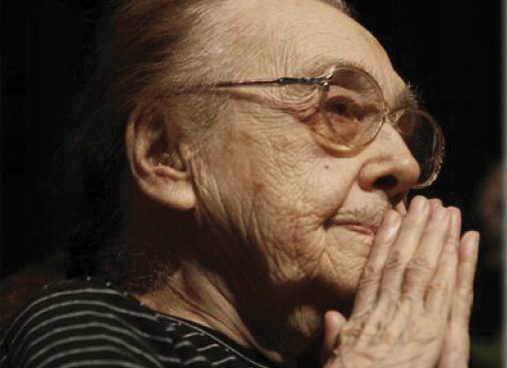Holocaust Survivor Helen Sperling Shares Her Story

Holocaust survivor Helen Sperling came to Colgate on October 1. At the age of 94, it is difficult for her to travel, but the powerful desire to share her story again brought her to Colgate for almost the fortieth time. Attendants sat close to Sperling, who is wheelchair-bound and recovering from an illness, in an intimate atmosphere as she recounted her
harrowing experience.
Growing up in Poland in an affluent family, Sperling had what she describes as “a very normal life.” As a young adult, she went to France to study medicine. When Adolf Hitler was given the Sudetenland regions of Czechoslovakia in 1938, many thought that it would be the end of his territorial ambitions. Most people there also refused to believe Hitler’s platform on Jews and other non-German racial groups.
“Hitler was telling us exactly what he wanted to do with the Jews but we refused to listen. In Mein Kampf, he said he wanted to do away with the Jews, but no one believed him,” Sperling said.
During one of her vacations from school, she remembers telling her father how fearful she was of a potential German invasion. Her father wouldn’t have any of it, insisting that Germany, “the most civilized nation in the world,” would not do anything. The German army invaded Poland in 1939 and entered Sperling’s small town.
“For the first time, you did not know who was friend or enemy,” Sperling said.
On the outskirts of town, Jews were abused and tortured by German soldiers. In a quavering voice, Sperling recalled when a group of three young German soldiers entered her house searching for gold. In her lecture, Sperling described how one of the German soldiers sat in her father’s chair, threw a towel at her mother and demanded that she polish his boots. Looking back on that traumatic event, Sperling believes that her mother “died” that day when she polished those boots.
Her father was similarly broken by the German occupiers: when the German commander kicked her family out of their house, he ordered her father’s favorite lilac bushes to be dug up and delivered to the commandant’s house in Germany. That was the first time Sperling witnessed her father cry. Many of the campuses Sperling has visited, including Colgate, have planted lilac bushes in memory of her father.
The Sperlings then moved to their town’s ghetto, an area Sperling never knew existed. Quarters were cramped, and a typhoid epidemic broke out almost immediately. People disappeared frequently in the ghetto; they were sent to death camps such as Treblinka.
Sperling also described an unfortunate situation involving her incredibly close Christian friend during her youth. One day, she snuck out of the ghetto and into a bakery where she used a phone to call her friend to wish her a happy birthday. Her friend’s response was short.
“You dirty Jew. How dare you call me,” her friend said.
Shortly afterward, everyone in the ghetto was sent to concentration camps. They were packed into cattle trains, where they were only able to stand.
“If you ask a survivor – any of us – what our least favorite word is, it is transport and selection,” Sperling said. She explained the origin of the gas chambers and described the process by which individuals were selected to go to them. Sperling was sent to the Ravensbrück women’s concentration camp, where prisoners “lost their names and became numbers.” At Ravensbrück, there were no beds or bunks and bathrooms were ditches with 2×4 planks spanning them. It was a camp designed to turn a human into a slave for work.
Sperling was then transferred to Buchenwald concentration camp and worked at an arms factory. Her kapo, or work supervisor, was a German prisoner with a black-on-green triangle on her outfit, denoting her status as a murderer and prostitute. Sperling recalls that she was a terrible woman, obsessed with destroying the dignity of those she led. If one wanted to repair an article of clothing, the kapo would trade a sewing needle for one week’s worth of bread. Since they worked at a factory important for the German war effort, Sperling and other prisoners banded together to sabotage it.
Sperling was liberated on a death march from Buchenwald. She can still remember “the wonderful sound” of American tanks moving. Following her liberation, Sperling married a survivor and moved to the United States.
“There is no country but America where you can make it,” Sperling said.
Once Sperling finished her story, she imparted some wisdom.
“Moses brought you Ten Commandments, I am going to give you the eleventh: do not be a
bystander,” Sperling said.
She continued saying that one cannot survive without love. She survived not because people were mean but because people were kind.
Helen finished her lecture with the Hasidic story of the 36 righteous. According to the legend, there are 36 righteous people in the world whose role is to justify the existence of mankind in the eyes of God. They are unaware of their own status and are destined to do extraordinary things.
“One of you could very well be one!” Sperling said.




Roger Staniforth • Sep 15, 2023 at 9:17 pm
Wonderful story told by Helen and maybe just gives us all a little hope. God is wonderful!